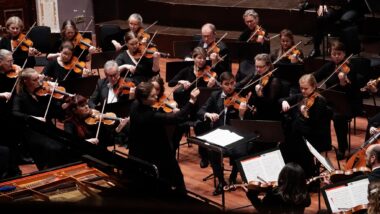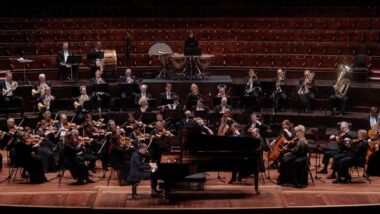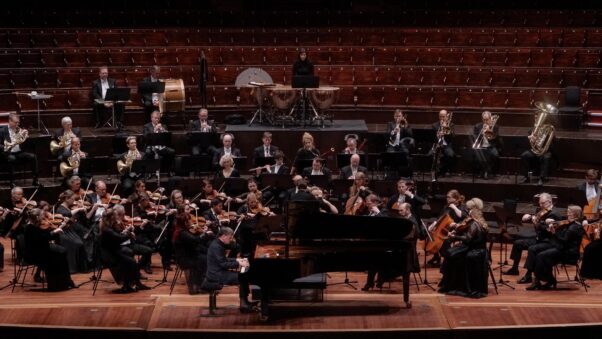 United Kingdom Rachmaninov, Tchaikovsky, Thorvaldsdottir: Sir Stephen Hough (pianist), Iceland Symphony Orchestra / Eva Ollikainen (conductor). Usher Hall, Edinburgh, 23.4.2023. (GT)
United Kingdom Rachmaninov, Tchaikovsky, Thorvaldsdottir: Sir Stephen Hough (pianist), Iceland Symphony Orchestra / Eva Ollikainen (conductor). Usher Hall, Edinburgh, 23.4.2023. (GT)

Thorvaldsdottir – Metacosmos
Rachmaninov – Piano Concerto No.2 in C minor, Op.18
Tchaikovsky – Symphony No.5 in E minor, Op.64
On a fine spring afternoon, it was welcoming to have a capacity audience for this outstanding orchestra from Iceland. Three years ago, their music-making under Jan Pascal Tortelier in a concert of French, Icelandic and Finnish music was very impressive. Most notable was the introduction to Scottish audiences of the young Icelandic composer Anna Thorvaldsdottir and her orchestral piece, Aeriality.
On this occasion, the Icelanders brought another work by the Grammy-nominated Thorvaldsdottir, Metacosmos. This piece received its Scottish premiere during the pandemic in a performance by the Royal Scottish National Orchestra as part of one of their subscription concerts.
The inspiration of Metacosmos is connected as much to the human experience as to the universe, in the composer’s own words, ‘the speculative metaphor of falling into a black hole – the unknown – with endless constellations and layers of opposing forces connecting and communicating with each other, expanding and contracting, projecting a struggle for power as the different sources pull on you and you realize that you are being drawn into a force that is beyond your control.’ The piece, Thorvaldsdottir says, is ‘constructed around the natural balance between beauty and chaos – how elements can come together in (seemingly) utter chaos to create a unified, structured whole.’
Metacosmos opened on the dark tone of the basses as if rising from the depths eliciting kinship with the music for Wagner’s Fafner in Das Rheingold and only broken by the flutes on high notes invoking Ligeti’s Atmosphères music used in the movie 2001 – A Space Odyssey. The orchestra produced great blocks of sound invoking imagery of meteors and comets crossing the night sky with impressive playing from the trombones and tuba and then switched over to a passage with the flutes and percussion invoking the playing of a rock band. Abruptly, this sequence closed and rose to a magical, ethereal world expressed on the strings before closing beautifully.
Eva Ollikainen took over from Jan Pascal Tortelier as Music Director in 2020 and made her debut here with the Royal Scottish National Orchestra in an evening of French and Russian music two years ago. I thought her conducting then was of a very high quality and one to watch out for – certainly she has already worked with Europe’s finest orchestras and is to make her Proms debut conducting the BBC Philharmonic Orchestra this summer with the world premiere of Thorvaldsdottir’s new orchestral piece, ARCHORA.
On their last visit here, the Icelanders brought with them the young Korean pianist Yeol Eum Son who played Ravel’s Concerto for the Left Hand and she has since become a rising star in the piano world. Now the orchestra were joined by the world-class English pianist, composer and award-winning author Sir Stephen Hough.

I have not heard this English pianist in the Russian repertoire, yet here Hough had before him the challenge of one of the finest Russian piano concertos, and perhaps the most romantic. I also have to confess that I have not heard this piece live for a number of years, so it was a welcome occasion as British pianists such as John Ogdon, John Lill and Barry Douglas have proved great interpreters of the Russian piano school – as if characteristic British restraint is a foil to Russian passion.
The Rachmaninov’s Second Piano Concerto opened with the tremendous bell-like rising chords from Hough heralding the beautiful fortissimo waves of the strings playing con passione, enhanced by a lovely clarinet from Arngunnur Árnadottir, and an evocative solo horn passage, as if the sun was emerging from a cloudy sky with the soloist constructing beautiful arpeggios. The second idea entered lyrically with the woodwind and strings developing to a powerful climax heralding the return of the serene, lyrical mood. In the Adagio sostenuto, the piano was delightfully accompanied by some gorgeous flute playing from Thomas Hancox, heralding a virtuoso passage from the clarinet beside lovely piano chords from Hough assisted by the violins led by Sigrún Eðvaldsdóttir. In the Allegro scherzando, powerful piano playing from Hough invoked the fiery dance-like theme enriched by stormy orchestral playing leading to a superb culmination. As an encore, Hough played a piece by the Polish composer Ignace Paderewski, his Minuet in G.
Tchaikovsky’s Fifth is among the most popular Russian works and just a month ago, Elim Chan conducted it in her farewell concert with the Royal Scottish National Orchestra, and, in May, the Scottish Chamber Orchestra will perform it under John Storgårds in a chamber arrangement. The great conductor Mravinsky performed it more than any other work, and always took a portrait of the composer with him on his travels. Mravinsky once said in an interview that the famous waltz, is a dance about death, nothing to do with romance.
Under the baton of the Finnish conductor Ollikainen, the opening sequence in the Andante emerged from the clarinet of Árnadottir and bassoon of Antonia Zimmermann gently announcing the leitmotif of fate that appears throughout the four movements as if a red line. The strings picked up the thread of a secondary idea by building to a stirring march under the energetic conducting of Ollikainen enticing thrilling brass playing before closing in a mysterious calm. In the Andante cantabile, the tender mood was expressed by a superb horn solo by Stefán Jón Bernharðsson and joined in a lovely duet with the oboe of Julia Hantschel, picked up by the flutes, leading to a passage of beautiful string playing. In the Valse: Allegro moderato, the idiom created was more like we are in a summer pastoral setting than entangled in the dance of death as expressed by Mravinsky and other conductors. The mood was carefree and sung eloquently by the clarinets and distinguished by a splendid bassoon solo from Zimmermann. In the finale, Andante maestoso, the idiom was heroic, with the glorious trumpets changing into the fast-moving Allegro vivace, with the conductor conjuring excitement as the theme of fate is submerged by triumphant joy and festivity, with the orchestra playing as if obsessed as the momentous beat from Soraya Nayyar on timpani set the tempo towards the celebratory climax.
This was an enjoyable afternoon and again strangely ignored by other music critics in Scotland. The calibre of performance from this outstanding orchestra deserves the attention of the Edinburgh International Festival.
Gregor Tassie

A good review, and I echo your feeling about it not being covered elsewhere.